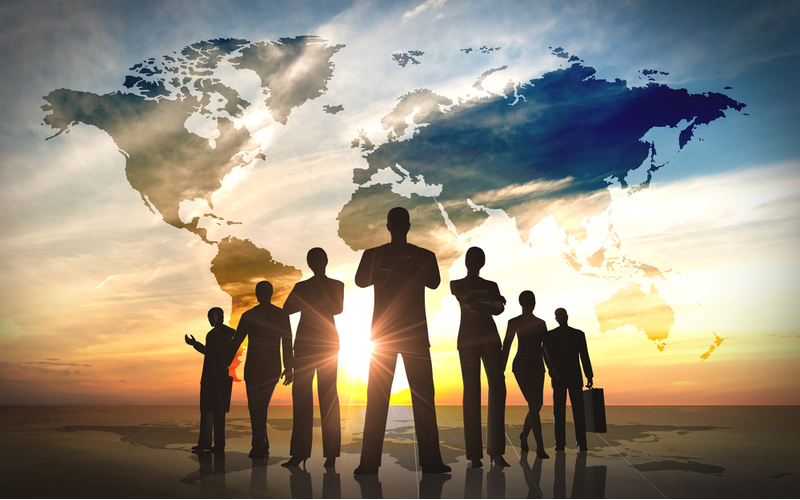What is the global business environment?
Posted on: April 14, 2022
We live in a highly interconnected world where international business has expanded and flourished, particularly since the 1980s when globalisation started to become the norm. However, trade’s share of global GDP peaked in 2008 and has consistently fallen in the last decade. Many economists believe that since that point, we have been witnessing deglobalisation.
In 2020, Solita Marcelli, deputy Americas CIO at UBS Global Wealth Management, said, “Deglobalization is a trend that is here to stay and will transform the next decade.”
When a company grows and expands beyond its home territory, it enters an international business environment. This means that it’s operating in different sovereign countries and must align with the different cultures of each external environment while carrying out business operations. The human resources team plays a large part in integrating the company with local customs and culture, as does the finance team, when it comes to regulations and compliance. Considerations for the entire company include the social, political, economic, regulatory, tax, technological, and legal environments.
The global business environment is changing
For multinational companies, the shift in focus to the Global South over recent decades has meant a change to the previous established approach of manufacturing in developing countries and selling in developed countries. Increasingly mobile and educated populations with purchase power across the world mean that developing countries want to produce goods for their own market. However, at the same time, many countries face potential labour shortages in manufacturing, partly due to Covid-19, and partly because cheap labour has been exploited in this sector for too long.
The BRICS nations (Brazil, Russia, India, China, South Africa) once presented the new frontier in business, but untapped emerging markets further afield are adding to the competitiveness of the global environment.
The connectivity that the internet has brought twinned with the rise of remote working means that the global talent pool has the potential to expand. It also means that rather than having multiple staffed headquarters around the world, multinationals may have remote teams or even third-party teams. In April 2020, James Gorman, the CEO of Morgan Stanley said, “We’ve proven we can operate with no footprint” and that he saw a future for the bank “with much less real estate.”
The obvious need for sustainability and social responsibility in the wake of climate change and extreme weather events has had an impact on how multinationals operate. From transparency in the supply chain to lowering the carbon emissions of the logistical network, a question mark hangs over the need for, and in some cases the viability of, air freight and shipping. The increased shipping taxes between the United Kingdom and Europe, as well as lorry queues at the border caused by Brexit, have forced some companies to open manufacturing and distribution hubs on mainland Europe.
In an article published in the Journal of Business Strategy back in 2004, it’s interesting to note that authors Dwight Allen and Michael E. Raynor discuss signs of deglobalisation and in a section titled “Potential impact of deglobalization” write,
“What would it mean for business if nationalism, protectionism, and international strife became prevalent? In such a world, the ability to buy, sell, and invest abroad would be curtailed by proliferating tariffs, duties, exchange controls, foreign ownership limits, and other restrictions. In some countries, key industries might be nationalized. Worsening international tensions could inhibit the movement of goods and raise companies’ security and insurance costs. Cross-border enforcement of rights and remedies would become less reliable, and executives and investors would have to contend with a welter of differing regulatory regimes, disclosure expectations, technology standards, and business practices. Moving key people from one country to another would be difficult in some cases.”
The world is undeniably in a stage of flux at this time in history, where free trade in the global economy is not so free, and alignments between nation states are changing due to the political environment.
How is business conducted in a global environment?
When it comes to international trade, business decisions should be made based on understanding the market through the cultural environment. Culture and tradition have an effect on the tastes and preferences of the customer and companies should be aware of and responsive to these sensitivities in their marketing activities. Prerequisites and regulations placed on trading by governments can also affect whether an international company decides to trade in a country or not. For example, until 2021, China’s mandatory animal testing policy for imported cosmetics meant that some brands, such as Laura Mercier and Hourglass, refused to trade in the country on ethical principles.
There are four distinct frameworks that businesses can use to operate in the international environment: through trade, investment, strategic alliances, and licensing or franchising. Entering into the global market through international investments means that by making foreign direct investments, the investing business has some control over companies and assets in other countries. A business may also make portfolio investments, by acquiring the stock of multiple companies in other countries.
Another way a business can tap into the global market is by creating a strategic alliance with a company in another country. These kinds of alliances come in many forms with some enabling both companies to access each of their home markets. This has the advantage of each company being able to market their products by using the affiliation with the better-known home company to get a foothold. This method is also the ideal way for a company to bypass any problematic regulations in a new territory with the support of the partnering company.
Finally, companies may participate in the international market by either licensing or franchising. Licensing involves granting another company the right to use its brand names, trademarks, copyrights, or patents in exchange for royalty payments. Franchising, on the other hand, is when one company agrees to allow a company in another country to use its name and methods of operations in exchange for royalty payments.
Enter the global business environment with an MBA
Expanding businesses can find growth in the world economy, and with the digital realm making it easier to reach international markets, the global business environment is open to all.
Embrace the spirit of entrepreneurship and find out how to navigate the rapidly changing business landscape by studying Keele University’s 100% online MBA.
